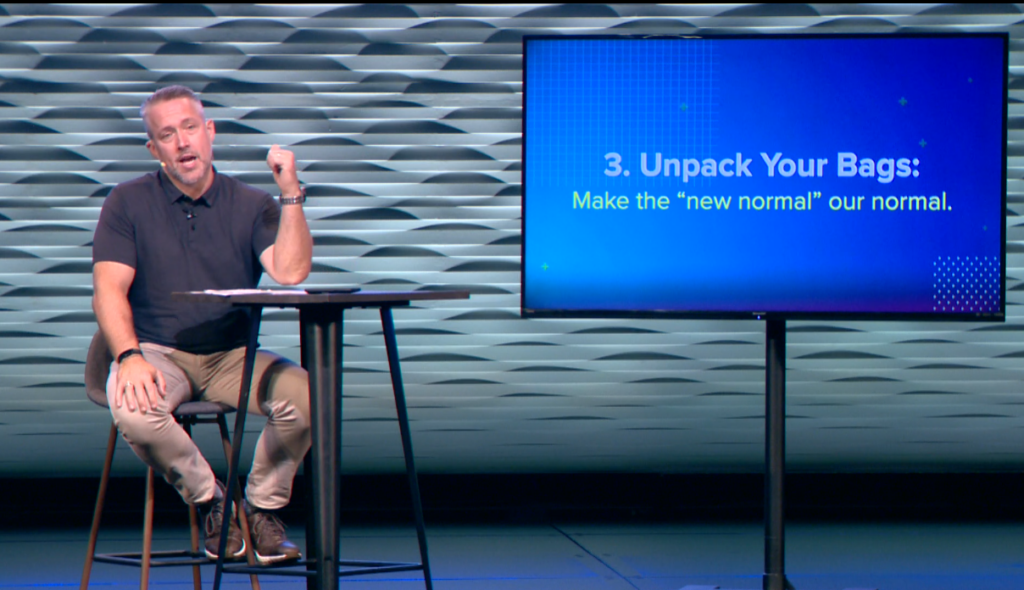JD Greear, lead pastor of the Summit Church and President of the SBC, announced to his congregation during a live stream that they were taking a page from Andy Stanely and would no longer be gathering as a corporate body until at least 2021.
Using the analogy of hotel guests not unpacking their bags when they stay at a hotel for just a few days, Greear thinks that those hopeful the church might still gather together as they were meant to need a dose of reality and must settle in and start putting their proverbial clothes in the dresser and hang their dresses on the coat hangers.
We need to begin to strategize like this is the new normal. We’ve got to unpack our bags. There’s some of you that are waiting in the wings, ok? And what I want to tell you is if your walk with God is important to you, and if your relationship to the church is important to you, then you got to rethink how you’re doing things. That has got to become for us the new normal.
Greear says that given the schools where some of the satellite campuses meet are doing the virtual thing and going online, the church in those locations cannot meet anymore, not seeming to consider that it should take more than that to shut down a congregation, and they could easily gather somewhere else or outside if they really wanted to.
Coupling the above with the fact that their gatherings are typically 500-1000 people and given their status and megachurch size, they don’t believe they can keep everyone safe by having an indoor church service. Consequently, in an act of ecclesiological madness, Greear announced:
We need to become, at least until the end of the year, basically a movement of house churches. Instead of The Summit Church being 12,000 people meeting in 12 different locations on the weekend, now we are going to be about 15,000 people meeting in about 2,400 locations.”
Elaborating more on what this means, Summit will take cues from the government and from a private, nonprofit organization classified as a 501(c)(3) public charity (The CDC) on how large the churches must be in order to gather:
We’re going to equip you to get together in essentially house churches. Small groups of people that are gathering in houses, according to what the authorities, what the government, what the CDC is deeming to be safe, in terms of regulation and group size.
We are still going to provide for you every weekend excellent weekend programming, but we’re going to adjust it so it’s easier for you to use in a house church setting, especially if you have kids, and let it feel more like an interactive church service.
We want you to begin to think of the weekend service not just as something you watch every week and participate virtually, but rather as a resource that we’re going to give you that you can use to worship, to pray, and connect with family members and friends
That’s the plan. To scatter the sheep and justify it by calling it “house churches,” even though there is no pastor or qualified elder to lead. Or church discipline. Or likely communion. It doesn’t take much to see that this is extremely high on the “bad idea scale”.
Speaking to that, If some of the congregations are 500 members, how is it that they don’t have a pastor and a plurality of elders who would be able to lead smaller congregations of 50 or 100? Are they really admitting that a flock of 500 doesn’t have 5 or 10 people trained up who are able to teach, to lead, to shepherd?
Rather, Summit is breaking themselves into 2400 congregations, averaging about 6.5 people per church (actually, we don’t know how the 12,000 number grew to 15,000. Assuming he misspoke, and it is the former, it’s more like congregations of 5)
We don’t know if this plan is better or worse than Andy Stanley’s decision to shutter, in terms of pure wretched ecclesiology, but we figure it has to be a contender.
Greer offers a final justification on closing up shop:
We can’t guarantee your safety, [or] your family’s safety right now if we came together physically on the weekends, and ultimately that’s what drives us, and missionally we’ve got to strategize with this being the new normal. We think this is the most loving thing we can do, and we think missionally its the most profitable thing for the movement of the disciple-making in the body of Christ. Even when you can’t come to church, we can still be the church.











